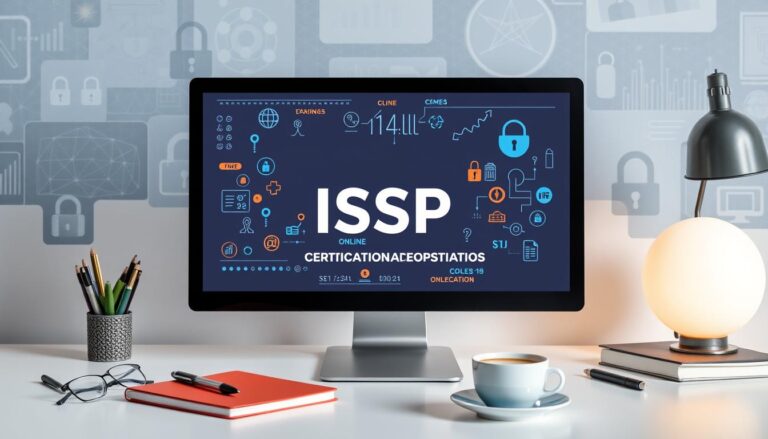
A mountain range with a sun setting in the background
As cyber threats continue to evolve, it has become increasingly necessary for professionals to gain advanced knowledge in cybersecurity to stay ahead. This is where the Certified Information Systems Security Professional (CISSP) certification comes into the picture. If you live in Marshall, VA, and are interested in CISSP training and certification, then you are in the right place! In this article, we will discuss everything you need to know about CISSP training and certification in Marshall, VA.
The Importance of CISSP Certification in the Cybersecurity Industry
CISSP certification is one of the most sought-after certifications for cybersecurity professionals. It is globally recognized as a standard of excellence, providing proof of an individual’s knowledge and skills in the cybersecurity field. The importance of CISSP certification has only grown over the years, with organizations increasingly seeking certified professionals to protect their systems, networks, and data from cyber threats.
One of the reasons why CISSP certification is so important is because it covers a wide range of cybersecurity topics, including access control, cryptography, and security operations. This comprehensive approach ensures that certified professionals have a deep understanding of the various aspects of cybersecurity, making them better equipped to handle complex security challenges.
Another benefit of CISSP certification is that it can lead to higher salaries and better job opportunities. According to a survey by (ISC)², CISSP-certified professionals earn an average of 25% more than their non-certified counterparts. Additionally, many organizations require CISSP certification for senior-level cybersecurity positions, making it a valuable asset for career advancement.
How to Prepare for the CISSP Exam: Tips and Strategies
Passing the CISSP exam requires a lot of hard work, dedication, and preparation. The exam covers eight broad domains, and candidates need to have a deep understanding of each to succeed. Some tips and strategies for preparing for the CISSP exam include joining a study group, taking a practice exam, and reviewing the official ISC2 CISSP study guide.
Another important strategy for preparing for the CISSP exam is to stay up-to-date with the latest developments in the field of cybersecurity. This can be done by attending industry conferences, reading relevant publications, and participating in online forums and discussions. It is also important to have hands-on experience in implementing security measures and dealing with security incidents, as this will help you understand the practical applications of the concepts covered in the exam.
The Benefits of Taking a CISSP Training Course
While self-study is an option, taking a CISSP training course can significantly improve your chances of passing the exam. A CISSP training course will give you a more structured approach to studying and provide you with hands-on experience in real-life security scenarios, helping you reinforce your knowledge and skills.
Understanding the Domains Covered in the CISSP Exam
The CISSP exam covers eight domains, including Security and Risk Management, Asset Security, Security Architecture and Engineering, Communication and Network Security, Identity and Access Management (IAM), Security Assessment and Testing, Security Operations, and Software Development Security. It is essential to have a deep understanding of each domain as they cover different aspects of cybersecurity.
Each domain covered in the CISSP exam is equally important and requires a thorough understanding to pass the exam. Security and Risk Management domain covers topics such as security governance, risk management, and legal and regulatory compliance. Asset Security domain focuses on protecting organizational assets, including physical, digital, and intellectual property. Security Architecture and Engineering domain deals with designing and implementing secure systems and architectures. Communication and Network Security domain covers topics such as network architecture, transmission methods, and secure communication protocols. Identity and Access Management (IAM) domain focuses on managing user access and authentication. Security Assessment and Testing domain deals with testing and evaluating the effectiveness of security controls. Security Operations domain covers topics such as incident management, disaster recovery, and business continuity planning. Finally, Software Development Security domain focuses on secure software design and development practices.
How to Choose the Right CISSP Training Provider in Marshall, VA
When choosing a CISSP training provider, it is crucial to do your research. Look for a provider that has a good reputation and offers comprehensive training materials and resources. Consider factors such as the quality of the instructors, class size, flexibility of the training schedule, and the cost of the program before making a decision.
It is also important to consider the format of the training. Some providers offer in-person training, while others offer online courses. In-person training can be beneficial for those who prefer a more hands-on approach and the opportunity to network with other professionals in the field. On the other hand, online courses offer more flexibility and convenience for those with busy schedules or who live in remote areas.
Best Practices for Maintaining Your CISSP Certification
Maintaining your CISSP certification requires a commitment to ongoing education and professional development. Some best practices for maintaining your CISSP certification include attending continuing education courses, participating in industry-related events, and staying up to date with the latest developments in the cybersecurity field.
Another important aspect of maintaining your CISSP certification is to actively engage with other professionals in the field. Joining professional organizations and networking with other cybersecurity experts can provide valuable insights and opportunities for collaboration. Additionally, seeking out mentorship or coaching from experienced professionals can help you stay on top of industry trends and best practices.
It is also important to regularly assess your own skills and knowledge gaps. This can be done through self-assessment tools, such as practice exams or online quizzes, or by seeking feedback from colleagues or supervisors. By identifying areas where you may need additional training or education, you can proactively address any weaknesses and continue to grow as a cybersecurity professional.
Career Opportunities and Salaries for CISSP-certified Professionals
A CISSP certification can open up many career opportunities for cybersecurity professionals. The certification is highly valued by employers and can lead to positions such as Chief Information Security Officer (CISO), IT Security Consultant, Security Analyst, and Security Manager. The average salary for a CISSP-certified professional is around $130,000 per year.
Additionally, CISSP-certified professionals are in high demand in various industries such as finance, healthcare, and government. With the increasing number of cyber threats and attacks, companies are investing more in cybersecurity measures, which creates a need for qualified professionals. Furthermore, CISSP certification is recognized globally, which means that certified professionals can work in different countries and regions.
Comparing CISSP Certification to Other Cybersecurity Certifications
There are many cybersecurity certifications in the market, but CISSP certification stands out for its high standards and global recognition. Compared to other certifications such as CompTIA Security+, Certified Ethical Hacker (CEH), and Certified Information Security Manager (CISM), CISSP certification covers a broader range of topics and carries more weight in the industry.
Additionally, CISSP certification requires a minimum of five years of professional experience in the cybersecurity field, making it a more advanced certification. This experience requirement ensures that CISSP holders have a deep understanding of the industry and are equipped to handle complex cybersecurity challenges. Furthermore, CISSP certification is recognized by government agencies and large corporations, making it a valuable asset for professionals seeking career advancement opportunities.
Real-world Applications of CISSP Knowledge and Skills
The knowledge and skills gained from CISSP certification are directly applicable to real-world security scenarios. Many CISSP-certified professionals use their skills to secure the networks and data of large organizations, prevent cyber attacks, and ensure business continuity.
Additionally, CISSP knowledge and skills can also be applied to personal cybersecurity. With the increasing amount of personal information being shared online, it is important for individuals to understand how to protect their own data. CISSP-certified professionals can use their expertise to educate others on best practices for securing personal devices and online accounts, as well as identifying and avoiding potential cyber threats.
Common Misconceptions about CISSP Certification
There are several misconceptions about CISSP certification, such as it being only for IT professionals or that it is too difficult to attain. However, CISSP certification is suitable for anyone keen on entering the cybersecurity field, and with the right preparation, the exam is achievable.
Another common misconception about CISSP certification is that it is only recognized in the United States. However, CISSP is a globally recognized certification that is highly valued by employers worldwide. It demonstrates that the holder has a comprehensive understanding of cybersecurity principles and best practices, making them a valuable asset to any organization.
Additionally, some people believe that CISSP certification is only relevant for those working in large corporations or government agencies. However, cybersecurity threats are present in organizations of all sizes and industries. CISSP certification provides a broad range of knowledge and skills that can be applied to any organization, regardless of its size or sector.
A Step-by-Step Guide to Obtaining Your CISSP Certification
If you are interested in obtaining your CISSP certification, here is a step-by-step guide. First, ensure that you meet the eligibility requirements for the certification. Next, study for the exam by joining a training course or using a study guide. Then, pass the CISSP exam and apply for certification from the International Information System Security Certification Consortium (ISC2).
Once you have obtained your CISSP certification, it is important to maintain it by earning continuing education credits. This can be done by attending conferences, taking additional courses, or participating in relevant professional activities. Failure to maintain your certification can result in it being revoked.
Having a CISSP certification can greatly enhance your career opportunities in the field of information security. It demonstrates to employers that you have a deep understanding of security principles and best practices, and can be trusted to protect their organization’s sensitive information. Additionally, CISSP certified professionals often earn higher salaries than their non-certified counterparts.
The Future of CISSP Certification and Cybersecurity Careers
The growing number of cyber threats means that the demand for cybersecurity professionals will continue to rise. The future of CISSP certification and cybersecurity careers is bright, with job opportunities expected to increase significantly in the coming years.
As technology continues to advance, so do the methods and tactics used by cybercriminals. This means that cybersecurity professionals will need to stay up-to-date with the latest trends and techniques in order to effectively protect their organizations. CISSP certification provides a comprehensive understanding of cybersecurity principles and practices, making it a valuable asset for professionals looking to advance their careers.
In addition to job security and career advancement opportunities, cybersecurity professionals can also expect competitive salaries. According to the Bureau of Labor Statistics, the median annual wage for information security analysts was $103,590 in May 2019. As the demand for cybersecurity professionals continues to grow, it is likely that salaries will also increase.
Success Stories: How CISSP Certification Boosted My Career
Many cybersecurity professionals credit their CISSP certification for the success they have achieved in their careers. The certification has opened up new opportunities, increased their credibility in the industry, and led to higher salaries.
In conclusion, CISSP certification is a valuable investment for any cybersecurity professional looking to advance their career. If you are in Marshall, VA, and looking to pursue CISSP training and certification, consider the tips and strategies mentioned in this article. Good luck!
One of the key benefits of CISSP certification is the ability to stay up-to-date with the latest trends and technologies in the cybersecurity industry. The certification requires ongoing education and professional development, which ensures that certified professionals are always equipped with the latest knowledge and skills.
Additionally, CISSP certification provides a sense of community and networking opportunities. Certified professionals can connect with other CISSP holders and share knowledge and experiences, which can lead to new job opportunities and collaborations.



